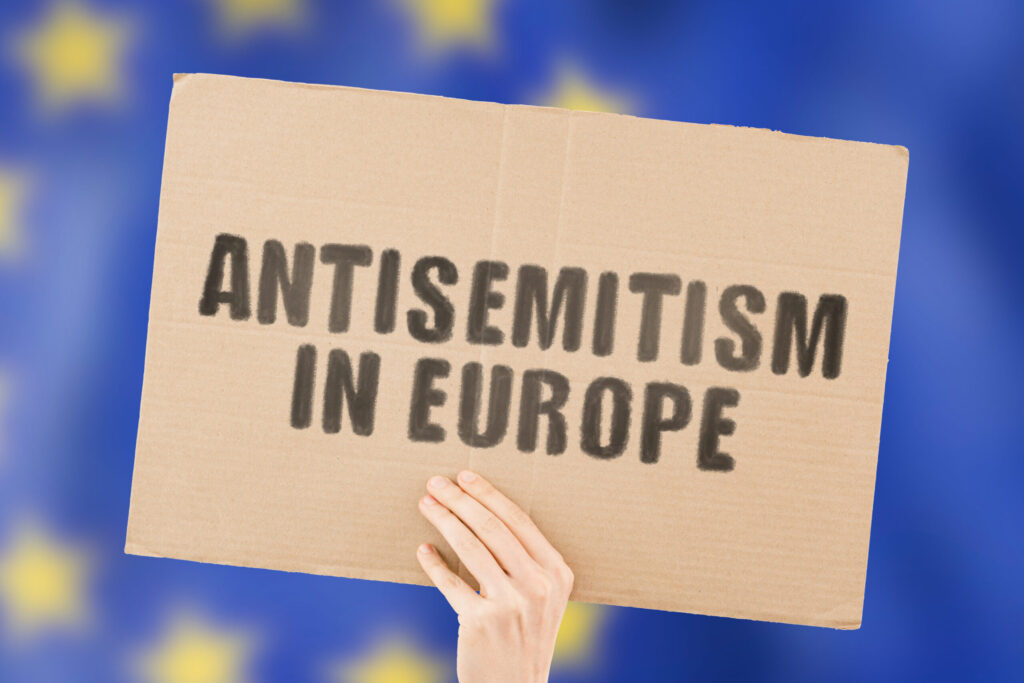The Two Most Important Things to Know About Antisemitism

Photo: Shutterstock
The following column appeared previously in the Daily Hampshire Gazette.

The two most important things for us to know about antisemitism today are, first, that it is not universal, and second, that it is not what Israel is fighting in Gaza. Whatever the U.S. government’s reasons for supporting the ongoing massacre of Palestinian civilians in Gaza and more limited assaults on the West Bank, it seems clear that many Americans, not only Jews, believe that the government of Israel is doing what it must, to protect Israel from a world of Jew-hating antagonists, threatening its very existence.
The major reason for this belief, is the common misunderstanding that the Jewish people live under the threat of an antisemitism that is universal and unceasing. Something like the xenophobic fear of others, found in most every developed economy on earth, at most any historical moment. The idea of antisemitism’s universality has been a central theme of Zionists, as the reason for their striving to create a state ruled by Jews alone, as the only way for Jews to be safe. But the “hate of Jews” that Europeans and their descendants call antisemitism is historical, not timeless. And it is not found everywhere. It is unknown in most of the world.
The anti-Jewish hatred faced by the Jews of Europe, and the Americas, originated with the anger of the first generations of Christian theologians, at the Jews who refused to accept the development of Christianity out of Judaism. And it was cultivated by the Christian clergy in Europe and then the Americas through the following 17 centuries. Protestant Christianity began as strongly anti-Jewish as Catholic or Orthodox Christianity. The Christian persecution of Jews in Europe dissipated with the growth of a secular sphere in the 17th and 18th centuries. By the time that Napoleon was unlocking the European ghettos in the first decade of the 19th century, Christian persecution of Jews was in serious decline.
Europe’s and America’s secular antisemitism is a residue of that fifteen centuries of Christian church teaching, expressing the same claims of Jewish materialism and danger to non-Jews, as its clerical source. Though it does not emanate from Christian clergy, it is still essentially a phenomenon of European Christians and the culture of their descendants. The authoritarian governments and the people who murdered more than 6 million Jews in the Holocaust of World War II, were not atheists or Africans or Asians, or Hindus or Buddhists or Confucians; they were European and Christian, continuing 17 centuries of the European-Christian persecution of Jews.
Antisemitism is not universal. There is no antisemitism to speak of in India or China. There is no record of antisemitism in Pakistan or Indonesia, the world’s most populated Muslim nations. Or there was none prior to the arrival of Europe’s Christians. There was no antisemitism in Australia or Africa, before the arrival of the Christians, who brought it with them.The antisemitism that exists in North and South America today, is a greatly-diminished fragment of Europe’s Christian antisemitism.
As for the United States, the white nationalist who killed 11 Jews and grievously wounded 6 others at the Tree of Life synagogue in Pittsburg in 2018, was a product of 21st-century white-supremacist American culture. I have no idea as to his religion, or even if he had one. But his avowed anti-immigrant, antisemitism, came from here. Though I have heard people offer the opinion that the people of the Near East or Palestine have been at each other’s throats forever, or for centuries, that is not the reality. When the European Zionists got to Palestine in the 1880s and 90s they found around 10,000 Jews, living peacefully with other Palestinians, who were mostly Arabic speaking Muslims, but included Christians and Druze, all under the government of the Ottoman Turks. Jews in the Arab and Turkish Muslim world were dhimmi (people of the book), second-class citizens, precisely on the same level as Christians. They were treated better than the majority of non-Muslims (like the Hindus or Buddhists of India and Southeast Asis) who were not monotheists, who were treated as third class or worse. They paid extra taxes for not being Muslims and they were restricted from building showy synagogues or seeming too important, but they were not persecuted as Jews had been for the previous 17 centuries in Europe. Nor have Jews ever been driven out of any Muslim country, as medieval Christian kings and emperors of Western Europe drove Jews into Eastern Europe.
There is no history of pogroms in the Near East, like the ones in Eastern Europe, that drove my family here from Ukraine. The antisemitism of Christian Europe is what drove Jews to Palestine during the 20th century. Zionism was a response to the vicious antisemitism of Christian Europe, that seemed to be disappearing from Europe, when it erupted so horribly under the fascist regimes of the mid-20th century.The conflict between the 20th-century Jews of Palestine, who created the state of Israel, and the Palestinians, who are the indigenous people of the preceding centuries, only began with Theodor Herzl’s Zionism in the 20th century. There was no tradition of Muslims attacking Jews in Palestine, before Zionists began to expel Palestinians from the land that they were buying up, with European and American financing on the verge of the World War I.
The genocidal war going on in Gaza today is continuation of a century and a quarter of the Zionist invasion of Palestine, and the Christian European fascist holocaust of the 20th century. It was triggered by the massacre of Israelis by Hamas on Oct. 7, 2023, but it not the product of that terrible event. And it is not a matter of Israel defending itself from antisemitism.
Gary Michael Tartakov is a resident of Amherst
